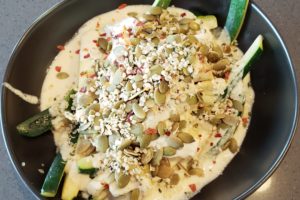This December, what if you focused more on what you put in to your holidays, instead of what you cut out?
Let’s start by look at what you can add more of:
Presence: Are you fully there with your food and those you are sharing your meal with? Or are you like so many people who immediately turn on their cell phone to watch a video, or check your email while eating? You can often see whole families tune out the minute they get sit down with their food. When we are distracted, we often tend to eat more than we are really hungry for. We also tend to eat faster and while not chewing our food as well. All of these can lead to digestive discomfort, which can be misdiagnosed as some sort of other issue.
Awareness: Similar to presence, awareness takes another step. With awareness, we start to look inward to discover where our desire to eat is coming from. For many people, the urge to eat doesn’t actually originate from hunger pangs…but often from all sorts of other places such as unmet emotional needs for example.
Intention: One thing that typically goes undiscovered by most people when they eat is intention. Holidays are a perfect example of intention. The tradition of saying grace or other speeches before eating are typically full of intention. During a holiday (or birthday) we say a few words to set the tone of the meal. This can be done with every meal. Don’t worry, this doesn’t have to be said out loud or be overly complicated. Simply saying a few words in your mind can help you set your intention. By knowing your intention, you can then make other decisions about how, what, and how much food you will eat. This single act, can bring a whole new energy of excitement or connection to you and your food.
Curiosity: Curiosity is absolutely necessary when trying new foods, and if your intention with a meal is better health or a more positive relationship with food, then trying new foods is highly encouraged. In addition to trying new foods, curiosity helps us to play the role of detective. The detective role can help you decide how you feel about a given meal. Are there foods you have always wanted to try but have been too hesitant to do so? Well, curiosity can help make some room so the hesitation or fear isn’t overwhelming.
Enjoyment: In the land of food rules, enjoyment is typically sent to the back of the line. In mindful eating, enjoyment is typically taking center stage. When we overlook the joyful factor that food plays in our lives, we often end up restricting ourselves right into a binge later on. We are creatures that thrive in a life filled with joy. While we can’t control what the world throws at us, we can learn to develop and cultivate more joy around food.
Pleasure: While similar to enjoyment in many ways, pleasure is a more primal type of feeling. This is in contrast to enjoyment which has a more psychological underpinning that can be highly influenced by our culture, traditions, and thought patterns. If a food tastes horrible then it’s not pleasing and if it’s not pleasing then we won’t be motivated to eat it and thus we won’t get much, if any, enjoyment out of the experience. Sure, taste buds take time to adjust to dietary changes and so it can take time for foods that you once scoffed at to start tasting great. While our taste buds are changing, overly restricting your diet can lead to some serious feelings of deprivation. These feelings can lead straight into a binge or to mindless eating in general. When we let curiosity, intention, pleasure, and awareness dance together, we often find that we are surprised how yummy a new food (or spice/herb) tastes.
Experiences: These days it seems like many people are eating solely to provide fuel for their body. As you can guess based on what you have already read, this approach can be problematic. The experience of eating a meal includes the sights, sounds, flavors, and aromas of the food, but also the company we keep while eating. These experiences are tied to our sense of pleasure. When we are fully present to the experience of eating, we usually find that we don’t need all the electronic distractions.
So, what’s your relationship with food? Would you like to learn more about mindful eating skills? Consider signing up for my intensive mindfulness of eating training so you can begin the new year with a new perspective!







